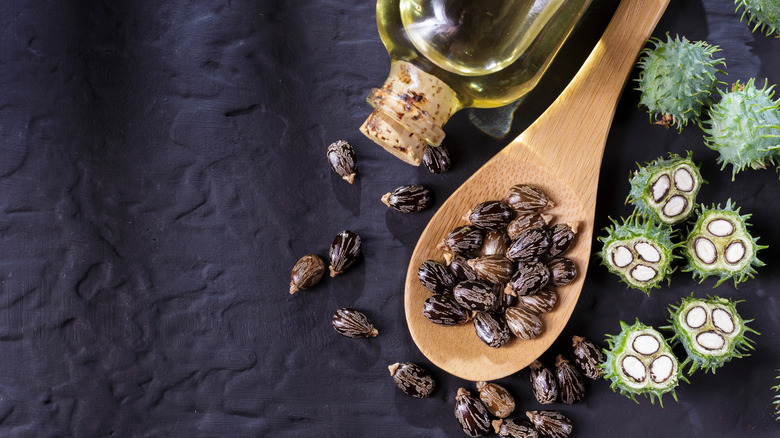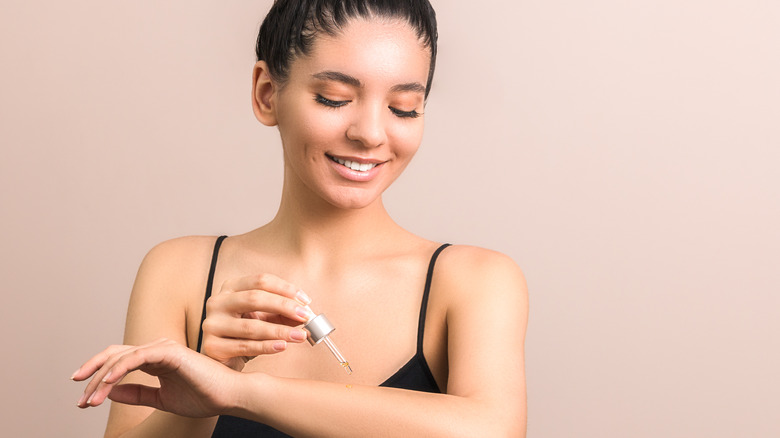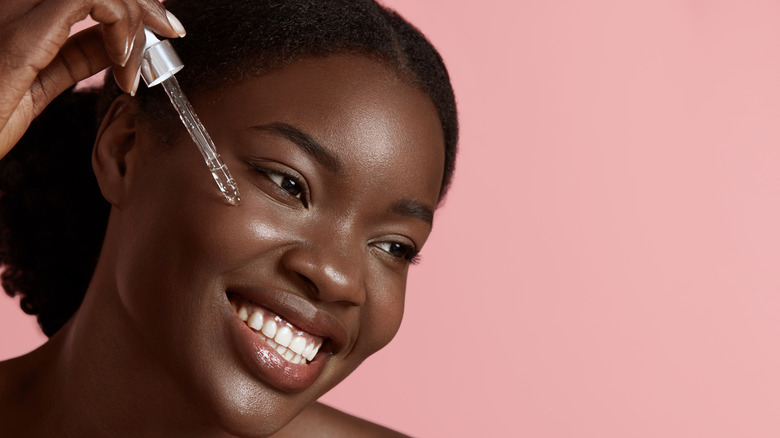Should You Use Castor Oil On Your Skin?
Castor oil is a vegetable oil with a golden hue that comes from the Ricinus communis plant, according to Healthline. It's made by removing the seeds (known as castor beans) from the plant, then extracting the oil from them and heating it until it's safe for use. While castor oil may seem like it's stepping into the spotlight these days, there's nothing new about this oil. According to Healthline, castor oil has been used for thousands of years for its medicinal and household purposes. WebMD shares that castor oil dates as far back as ancient Egypt, when it was used in oil lamps. Cleopatra also reportedly thought the oil brightened her eyes. While Cleopatra's claim isn't science-backed, the oil does have some powerful health benefits.
One of the biggest reasons castor oil is considered so healthy may be because of its nutritional profile. WebMD explains that castor oil is a rich source of vitamin E, omega-6, and omega-9 fatty acids. The omega-9 found in the oil, ricinoleic acid, is especially powerful, explains Agora Integrative Health. Research from the International Journal of Research in Pharmacology & Pharmacotherapeutics shows that it has anti-cancer, antidiabetic, anti-inflammatory, and lubricant activity. In addition, WebMD suggests that castor oil may treat certain skin conditions like dandruff or ringworm. With all these benefits, you may be wondering if it's safe to use castor oil directly on your skin. Keep scrolling to find out more.
The benefits of castor oil on your body
According to Medical News Today, it's generally safe to use castor oil on your skin. However, if you're looking for optimal absorption, it may be better to dilute the oil in a carrier oil (i.e. coconut oil, almond oil, etc.). They suggest diluting the castor oil with a 1:1 ratio into the carrier oil of your choice. After diluting the oil, rub the mixture onto the skin and enjoy its skin health benefits. Keep in mind, there are some case reports of individuals who are allergic to castor oil. So if you experience an allergic reaction after using the oil, make sure to get help right away. But if you're in the clear, here are some potential skin benefits you can expect.
One 2018 study published in Polymers for Advanced Technologies explains that ricinoleic acid can act as a pain reliever as well as an anti-inflammatory, meaning castor oil has the potential to support wound healing in the skin. Additionally, because ricinoleic acid is a fatty acid, it may promote skin hydration (per Healthline). Castor oil is very thick, and Healthline explains that it acts as an occlusive moisturizer, meaning it stops water loss through the skin. This makes it a great skin hydrator.
A different 2015 study published in Brazilian Oral Research reports that castor oil is also antimicrobial. Its antimicrobial properties may protect against certain strains of unwanted bacteria.
The benefits of castor oil for your face
There are a lot of potential skin benefits when it comes to using castor oil on your face. For starters, the oil helps fight against acne since it's antimicrobial and anti-inflammatory, and it also isn't likely to clog pores, points out Medical News Today. Believe it or not, the fatty acids found in the oil can also help with skin texture.
Just like on the body, castor oil is moisturizing for your face too, explains Healthline. The moisturizing benefits combined with its antioxidant and anti-inflammatory properties makes the oil a great choice for warding off signs of aging. This includes preventing wrinkles, decreasing puffiness, and all around supporting a healthy glow. While these benefits look promising, keep in mind more research is needed to confirm them.
So should you use castor oil on your face? If you want to, Healthline says it should be safe to try. Byrdie explains that you'll want to apply the same 1:1 dilution ratio as you would on the rest of your skin. However, if you feel like your face is needing a little extra TLC, then "dip a small cotton ball into castor oil, and then apply it to your skin before going to bed," says medical herbalist Katie Pande to Byrdie. Feel free to sleep with it on, or gently wipe it off after 5 minutes with a warm towel, points out Healthline.



